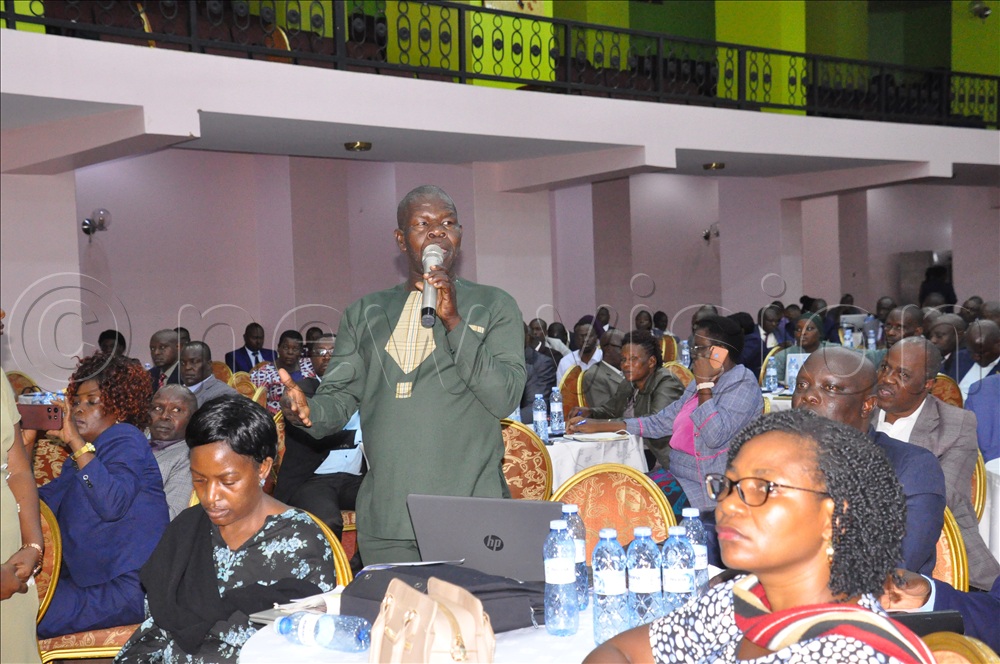Govt says to roll out quarterly barazas to strengthen service delivery
“We need to have barazas in all local governments to discuss service delivery issues,” Kumumanya said.
Ben Kumanya Permanent Secretary Ministry of local government addressing participants during a meeting with District Health Officers (DHO) and District Education Officer (DEO) at Imperial royale on September 23, 2025. (Photos by Nancy Nanyonga)
________________
In a bold move aimed at improving accountability and citizen engagement, the Government says it is planning to roll out quarterly barazas across all districts.
Local government ministry permanent secretary Ben Kumumanya says the initiative will enable citizens to air their grievances directly and allow government leaders to respond in real time. This is in a bid to bridge the persistent gap between public servants and the people they serve.
He made the revelation during a meeting with district health officers (DHOs) and district education officers (DEOs) at Imperial Royale Hotel in Kampala on Tuesday, September 23, 2025.
“We need to have barazas in all local governments to discuss service delivery issues,” Kumumanya said.
“Let the people talk. If they are not telling the truth, the technical people will give the facts, and the matter will be resolved.”
Baraza is a Swahili word that means a deliberation meeting held by a collective group of people of wisdom.
The forums, he explained, are not just forums for complaints, but platforms to deepen transparency, correct misinformation, and rebuild trust between communities and government institutions.
“Sometimes citizens demand things you cannot afford because you don’t have the resources. But when you explain the real situation — the lack of human resources, logistics, or funding — they begin to understand,” he said.

The announcement comes at a time when citizen dissatisfaction is rising over poor service delivery, especially in the health and education sectors. Kumumanya said barazas will serve as an accountability tool for both the civil servants and citizens, giving citizens a voice and holding public servants to the standards prescribed by law.
“In Wakiso and Mbale city, people had lost confidence in the civil servants. But on the other side, civil servants were also threatening industrial action. So, we need this dialogue. Barazas give people space to speak and to heal,” he said.
He urged civil servants to "engage from within" the system rather than politicise their frustrations, warning that public officers who misuse resources or abandon duty would be held accountable — even after leaving office.
Kumumanya also pointed to corruption as a major barrier to service delivery, calling it “a cancer in the system.”
He said the government receives reports of corruption “every single day” and urged civil servants to be part of the solution — not the problem.
“Let citizens speak. Let them say what they know. If the money for a health facility disappeared, someone must answer,” he said. “Barazas will help surface these issues early.”
The quarterly barazas are part of a larger drive to reinvigorate decentralisation, which Kumumanya said is being undermined by weak citizen oversight and underutilised local structures.
He cited Article 176 of the Constitution, which mandates a sound financial base for local governments and encourages local leadership to “plan, initiate and execute policies” affecting their communities.
“We are supposed to bring services closer to the people. But we can’t do that if citizens don’t know where their money is going, or if they fear to speak out. Barazas will help fix that,” he noted.
Kumumanya challenged local leaders to use barazas and budget consultative meetings as active tools to push for change and share innovations.
“You don’t have to wait for a crisis. If you have ideas, bring them now. If you have complaints, bring them now. We live in Kampala — but your ideas can move faster than paperwork,” he added.
He urged local leaders to document successes and challenges, so that all districts can learn from each other and improve service delivery together.